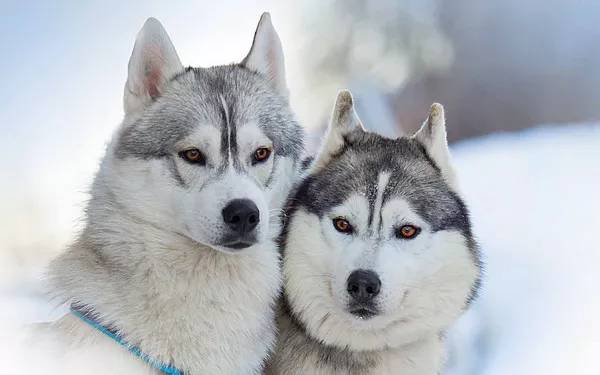Feeding a Siberian Husky involves more than just providing food. It requires understanding the breed’s unique dietary needs and preferences. Siberian Huskies are known for their high energy levels, strong physiques, and striking appearance. This article will guide you through the best practices for feeding your Siberian Husky, including nutritional requirements, recommended diets, and feeding strategies.
Understanding the Siberian Husky
Before diving into feeding specifics, it’s important to understand the Siberian Husky’s characteristics:
Energy Levels: Siberian Huskies are highly active dogs. They require a diet that supports their high energy needs.
Physical Build: They are medium-sized with a muscular and athletic build. This requires a balanced diet to maintain their health.
Coat Type: Their thick double coat can affect their dietary needs, especially in different weather conditions.
Nutritional Needs of a Siberian Husky
A Siberian Husky’s diet should support their active lifestyle and overall health. The key components of their diet include:
1. Protein
Protein is essential for muscle maintenance and overall health. Siberian Huskies need a diet high in quality protein to support their active lifestyle.
Sources of Protein: Look for foods with animal-based proteins like chicken, beef, lamb, or fish.
Protein Content: The food should contain around 20-30% protein. Puppies and active adults may require higher protein levels.
2. Fats
Fats provide energy and support a healthy coat. They are also crucial for the absorption of fat-soluble vitamins.
Sources of Fats: Look for sources like fish oil, chicken fat, or flaxseed oil.
Fat Content: The food should contain around 8-20% fat. Adjust based on the dog‘s activity level and age.
3. Carbohydrates
Carbohydrates provide energy and help maintain a healthy digestive system. However, Huskies do not require as many carbs as some other breeds.
Sources of Carbohydrates: Opt for complex carbs like sweet potatoes, brown rice, and oats.
Carbohydrate Content: Carbohydrates should make up around 30-50% of the diet.
4. Vitamins and Minerals
Vitamins and minerals support overall health and prevent deficiencies.
Essential Vitamins: Include vitamins A, D, E, and B-complex.
Essential Minerals: Look for calcium, phosphorus, and potassium.
5. Water
Always provide fresh water. Proper hydration is essential for all dogs, especially active breeds like the Husky.
Types of Dog Food
Choosing the right type of dog food can make a significant difference in your Husky’s health. Here are the main types:
1. Dry Kibble
Dry kibble is convenient and often helps keep teeth clean.
Advantages: Convenient, long shelf life, and typically cost-effective.
Considerations: Choose high-quality brands with appropriate protein and fat levels.
2. Canned Food
Canned food is often more palatable and contains higher moisture content.
Advantages: Higher moisture content, generally more flavorful.
Considerations: Often more expensive and may not be as effective for dental health.
3. Raw Diet
A raw diet (BARF – Biologically Appropriate Raw Food) mimics what a dog’s ancestors might have eaten.
Advantages: Can be very nutritious and natural.
Considerations: Requires careful planning to ensure nutritional balance and proper food handling.
4. Homemade Diet
Preparing homemade meals allows you to control ingredients and avoid fillers.
Advantages: Complete control over ingredients, can cater to specific dietary needs.
Considerations: Requires careful planning to ensure a balanced diet and can be time-consuming.
Feeding Recommendations for Different Life Stages
The dietary needs of a Siberian Husky change with age. Here’s a breakdown of feeding recommendations for different life stages:
1. Puppies
Puppies have higher energy and protein needs for growth and development.
Protein: 22-30% protein.
Fat: 8-20% fat.
Feeding Frequency: Feed 3-4 times per day. Gradually reduce the number of feedings as they grow.
2. Adult Dogs
Adult Huskies need a balanced diet to maintain their energy levels and health.
Protein: 20-30% protein.
Fat: 8-20% fat.
Feeding Frequency: Feed 2 times per day. Adjust portion sizes based on activity levels and body condition.
3. Senior Dogs
Senior Huskies may require adjustments in their diet to accommodate lower activity levels and potential health issues.
Protein: 18-25% protein. Lower protein levels may be needed if kidney function declines.
Fat: 8-15% fat. Lower fat levels may be beneficial if the dog becomes less active.
Feeding Frequency: Continue feeding 2 times per day, but monitor weight and adjust portions as needed.
Special Dietary Considerations
Certain conditions or situations may require special dietary adjustments:
1. Weight Management
If your Husky is overweight, adjust their diet to reduce calorie intake while ensuring they still get necessary nutrients.
Lower Calories: Choose a weight management formula or reduce portion sizes.
Increased Activity: Ensure the dog gets enough exercise to aid weight loss.
2. Allergies and Sensitivities
Some Huskies may have food allergies or sensitivities.
Common Allergens: Watch for allergies to ingredients like beef, chicken, or grains.
Hypoallergenic Diet: Consider hypoallergenic or limited-ingredient diets if allergies are suspected.
3. Joint Health
Joint health is crucial for active breeds. Supplements or specific diets may help maintain joint function.
Ingredients: Look for diets with added joint supplements like glucosamine and chondroitin.
Feeding Adjustments: Ensure proper weight management to reduce stress on joints.
Practical Feeding Tips
Portion Control: Follow feeding guidelines on the dog food package and adjust based on your Husky’s activity level and body condition.
Monitor Weight: Regularly check your Husky’s weight and adjust food portions as needed.
Avoid Table Scraps: Human food can disrupt your dog’s diet and cause health issues.
Regular Vet Check-Ups: Consult your veterinarian to ensure your Husky’s diet meets their health needs.
See also: How Much Food Does a German Shepherd Eat a Day?
Conclusion
Feeding a Siberian Husky involves understanding their unique dietary needs and making informed choices about their food. A balanced diet with appropriate protein, fats, and carbohydrates, along with proper feeding practices, will help keep your Husky healthy and energetic. Regular check-ups with your veterinarian will ensure that your Husky’s diet continues to meet their needs as they grow and age. By following these guidelines, you can provide the best nutrition for your Siberian Husky and support their overall well-being.


